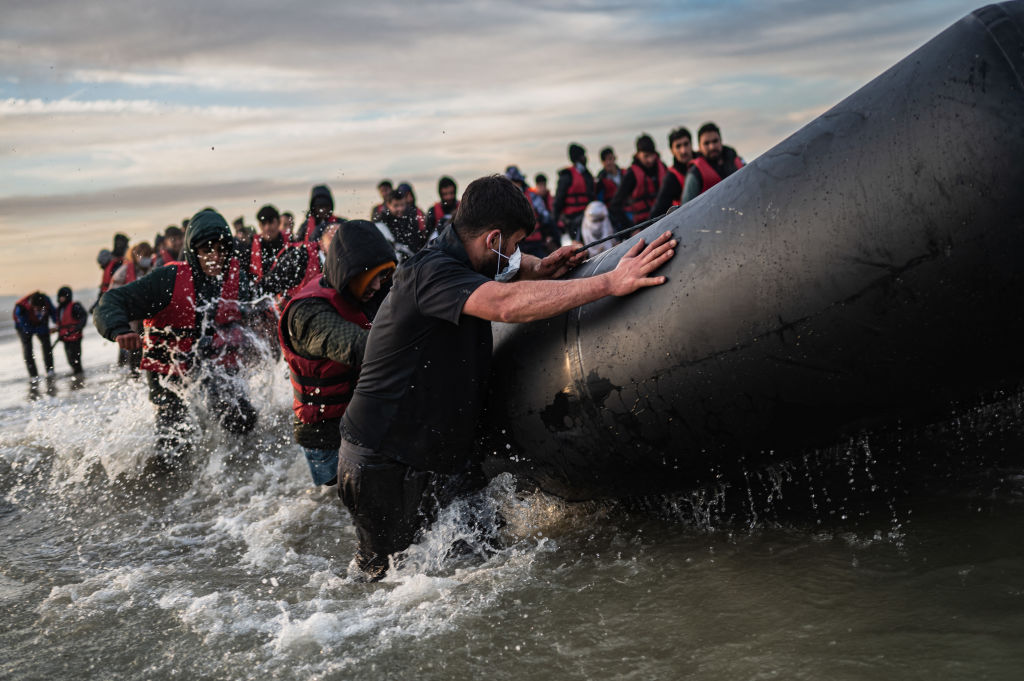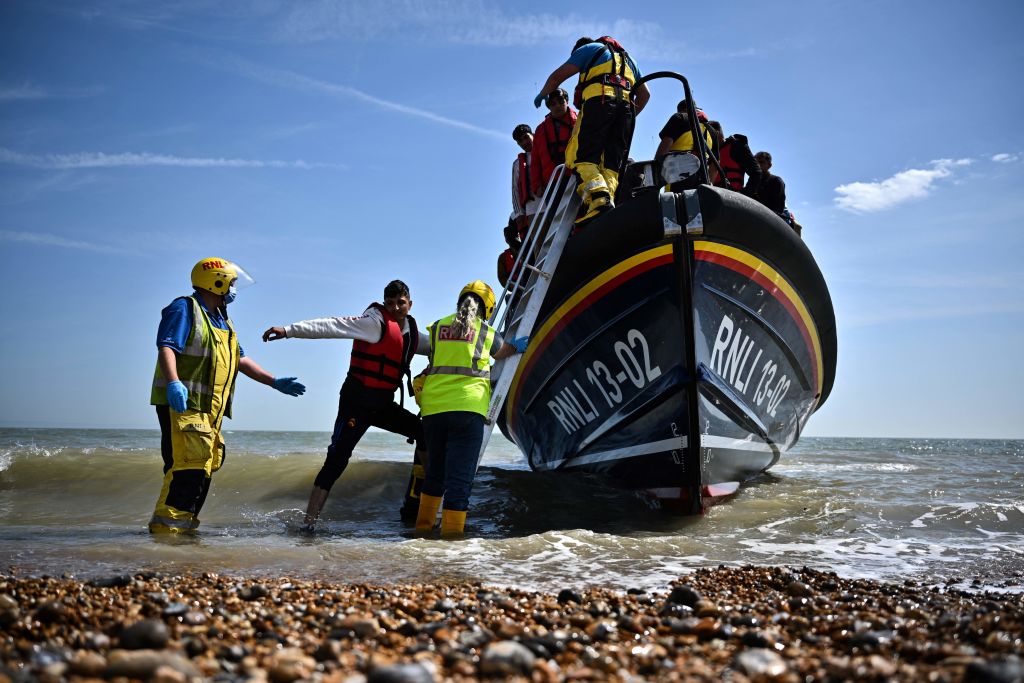It’s not hard to see why migrants come here. For those who make it across the Channel illegally, there is only a small chance of deportation. About 72 per cent of the predominantly young males who leave the safety of France can expect to have their UK asylum claims granted. The success rate is more than twice the EU average (34 per cent).
That’s part of the reason for the extraordinary growth in numbers coming across. Three years ago, 2,000 people arrived in small boats. So far this year, it’s 40,000. It’s funny to think that when 40 migrants crossed the Channel on Christmas Day in 2018, the then home secretary Sajid Javid was forced to cut short his family holiday amid the outcry. Last Saturday alone, 1,000 people made the crossing.
Britain’s generous asylum system has an obvious appeal. Then there is the generosity
of the state, which offers an average of £13,500 of public spending per head each year, including access to an extensive benefits system that typically does not demand a record of tax contributions, citizenship and has few qualifying hurdles besides demonstrable need. When you are from a country offering none of these things, who can blame you for trying your luck?

Throw in the world’s second language, extensive diaspora communities, no requirement for ID cards and a large informal economy still open to cash-in-hand remuneration and it is little wonder that vast numbers of men are pitching up in northern France willing to pay traffickers for a seat in a dinghy across the Channel. Some 12,000 this year were from Albania, a safe and free country – the equivalent of 1 or 2 per cent of their adult male population. The UK acceptance rate for Albanians is 53 per cent; in France it’s 8 per cent and in Sweden and Germany it’s zero.
Removals of foreign nationals have fallen from 46,000 per annum a decade ago to below 20,000 in 2019
At the last count, 127,000 asylum seekers
and their dependents were waiting to be processed, a number equivalent to the population of Exeter. Of those who arrived last year, just 4 per cent have been processed (and nearly nine in ten of those were accepted). All have to be accommodated in the interim at taxpayers’ expense. At the last count, some 25,000 asylum seekers were being billeted in hotels, some at a nightly cost of £150. This is on top of legal migration of 240,000 people a year, the same as the population of Swansea. No wonder the Home Office is struggling.
It’s easy to game the UK system. Would-be refugees can claim to be victims of modern slavery, or to be from a country that does not easily take back failed applicants, or they can say they are gay. Another option is to convert to Christianity when their country of origin is Islamic, thereby conferring on themselves a ‘well-founded fear of being persecuted’ under the 1951 Refugee Convention.
They can claim membership, however tenuous, of a political clan or faction that is out of favour at home. They can claim to be under 18, or try to find a British partner during the lengthy wait for their application to be processed. Given that 90,000 have been stuck in the system for more than six months while being legally prohibited from working, they have plenty of time. The applicants’ lawyers have no end of options.
Our deportation record for non-refugees is, meanwhile, very poor. Overall removals of foreign nationals (including convicted prisoners) have fallen dramatically from 46,000 per annum a decade ago to below 20,000 in
2019. The number of deportations fell below 10,000 in the Covid-affected
years of 2020 and 2021. A huge backlog of unresolved cases makes it unlikely that this will be rectified soon.
During the summer Tory leadership contest, Sunak set out a ten-point plan for fixing what he admitted was a ‘broken’
asylum system: ‘Law-abiding citizens are understandably shocked when they see boats filled with illegal immigrants coming from France to our shores, with our border force seemingly doing nothing to stop them.’ Sunak gave himself a deadline of 100 days. He hasn’t got long, and Tory MPs’ concern about their disgruntled voters is growing.
Then there’s the lurking presence of Home Secretary Suella Braverman. Though given to expressing herself rather crudely – see her pre-resignation attack on the ‘Guardian-reading, tofu-eating wokerati’ – Braverman is a cunning political operator. She is already putting Sunak under far more pressure to address migration than her predecessor Priti Patel ever managed with Boris Johnson. Her reference to an ‘invasion of our southern coast’ was scripted and the shocked reaction intentional. She aims to cast herself as someone with no illusions about the situation and with the determination to succeed.
Braverman is helped by the fact that the Tories know the danger they face; all over Europe, governments that do not control immigration are threatened by insurgent parties. So she is being cheered on by the traditional right of the party: John Redwood, Edward Leigh, Bill Cash and others, as well as influential red-wall MPs. While no cabinet minister can ever be regarded as unsackable, if Sunak were to try to remove her now, it would be seen as evidence of a worrying lack of grip on the immigration issue.
Sunak’s long-time ally, the immigration minister Robert Jenrick, has admitted that the government must now consider ‘radical options’. Yet the options being discussed pose difficulties that few in government have properly come to terms with. Despite announcing his intention to seek a new agreement with France to better patrol their borders, Sunak must know it won’t work. Such agreements have been reached before and proven ineffective. Given that France refuses point-blank to adopt the one measure that could solve the problem – simply agreeing to take back every migrant that the UK picks up in the Channel – its co-operation is unlikely to deliver a solution.
Sunak has hinted that he wishes to tweak the legal definition of a refugee. Rather mysteriously, he claimed his change would ‘prevent anyone who enters the UK illegally from staying here’. That would be extremely
difficult, given that Article 31 of the 1951 Convention expressly limits a state’s right to impose penalties on grounds of an applicant’s illegal entry. Sunak has promised to give parliament ‘control of the number of refugees we accept each year’. This sounded very much like a pledge to impose fixed quotas, which again is impossible to reconcile with Britain’s open-ended obligations under international law. Sorting this out would mean finding international agreement on a subject that many European leaders find hard to even discuss. Sunak has also said he wants to ‘tackle’ the European Court of Human Rights where it seeks to ‘inhibit our ability to properly control our borders’. Presumably the ECHR’s objection to the plan to send asylum seekers to Rwanda was partly what he had in mind.
Braverman has said it would be her ‘dream’ to restart the Rwanda scheme, but there are doubts that in its current form this plan will ever be deemed acceptable by the European courts. Even if it were, the Rwandan government has said that it only has capacity for 200 people. Already the scheme has cost an estimated £140 million and yet we have managed to send precisely zero migrants to Rwanda. Relying on a third country for something as sensitive as our migration policy seems fraught with problems, at the very least.
A radical alternative idea would be to set up offshore processing on a UK overseas territory, with Ascension Island being the most likely location, given its lack of any indigenous population who might object. If Sunak were able to introduce that new rule, signalling that illegal entry means removal, regardless of refugee status, there would be a very good prospect of dissuading anyone from paying £3,000 to people traffickers for a space in a boat to England. These reforms would not weaken Britain’s moral duty to refugees. If anything, controlling illegal immigration would increase public support for the refugees who arrive through legal routes. The money that is saved on legal fees for bogus claims could be spent on helping those in genuine need. The Homes for Ukraine scheme showed a huge impulse to step up when the need is seen as genuine, so it’s hard to accuse Britain of being an anti-refugee country. Sunak can say that the public anger over small boats is in reaction to the unfairness that those in genuine need are not being prioritised.

The real solution is to create a new system that all western countries can agree on. There is an obvious need to come up with a modern, practical and moral equivalent to the 1951 Refugee Convention. That old agreement is incompatible with the modern era of mass travel. When it was signed, those attempting to leave Albania faced imprisonment for treason. Today, you can fly direct from Albania to London for as little as £45. The ease with which international travel can now be achieved has fundamentally changed the migration equation.
It has changed politics too. Denmark’s Social Democrat government outmanoeuvred the country’s right by adopting draconian measures on integration and deportations, arguing that such toughness is progressive, as it promotes the fairness of the official system. Denmark is also in talks with Rwanda about setting up its own UK-style transfer scheme for asylum seekers. But long-term Sunak watchers wonder if he would really risk such apparently Trumpian manoeuvres as leaving the ECHR, pitching Britain once more against international legal architecture and drawing accusations of breaching the Good Friday Agreement.
During Europe’s 2015 migration crisis, Britain stood out. People smugglers hadn’t worked out sea routes to Britain, so the illegal influx went to France, Italy, Sweden and Germany. Their authorities were soon overwhelmed and deep social problems ensued – followed by an inevitable political backlash.
So Sunak should have no difficulty working out what will happen if he fails to address this problem. If there are still increasing numbers of small boats crossing, Tory-leaning voters will be yet more demoralised and disenchanted. The Brexit motto was ‘Take back control’. But it’s harder than ever to say that the Tories are in control. That leads to a deeper, more basic question: can Sunak govern?







Comments